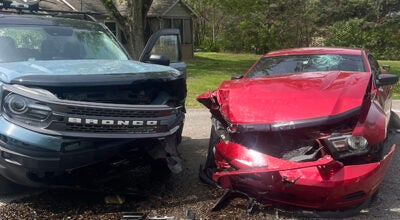‘Water Boys’ ride geyser of success
Published 4:24 pm Sunday, April 1, 2012

Charles Jesperson of the St. Joseph/Benton Harbor Rotary Club and Terry Allen of the Lakeshore Rotary Club are known as the “Water Boys” in the global effort to bring BioSand Filters and clean water to the Dominican Republic.
Rotary “Water Boys” Charles Jesperson and Terry Allen since May 2004 have seen their BioSand Filter Dominican Republic clean water project mushroom from $5,000 contributed by the St. Joseph/Benton Harbor, Benton Harbor Sunrise and Lakeshore clubs to $380,000 leveraged for $1.2 million.
Their 250 presentations, including two previously in Dowagiac, encompass Michigan, Illinois, Wisconsin, Minnesota, Virginia, Ohio and Arizona. They spoke in Delton Thursday morning. One in every six people globally lack safe drinking water, killing 1.6 million children annually — almost 5,000 a day or one every 15 seconds.
“We never expected or wanted it to get this big,” Allen, who will be District 6360 governor in 2013-14, told Dowagiac Rotary Club Thursday noon at Elks Lodge 889.
Partners have included the federal government through the U.S. Agency for International Development and the Navy’s Operation Handclasp, the Rotary Foundation for $500,000, Central Michigan University, Amway, 60-club District 4060 in the Dominican Republic, District 6290 in Grand Rapids/Rockford and 56 other Rotary clubs or districts in the United States and Europe.
Traditional concrete filters embedded with plastic pipe have given way to plastic HydrAid Filters available from the Safe Water Team, a 501c3. One mold can produce 600 to 1,000 shells daily weighing less than 10 pounds which ship 2,250 per sea container. Heavy concrete filters made in the Dominican Republic were turned out 16 to 20 daily. Cascade Engineering in Grand Rapids builds plastic filters with resin from Dow Chemical in Midland. Each costs $120. Union High’s Interact Club pumped gas at Family Fare for filters as its first international service project.
The Dowagiac club has contributed $3,000, which can be leveraged to afford 800 children, families and neighbors clean water. The district’s $380,000 translates into 6,300 filters.
Slow sand filters have been proven to almost entirely remove disease-causing organisms found in water known as pathogens, including bacteria, viruses (including Rotary’s pet project, polio), protozoa, cysts, helminthes and worms.
Pathogen removal occurs due to a combination of biological and mechanical processes. Organic material is trapped at or close to the surface of sand, forming a biological layer. Over one to three weeks, micro-organisms colonize this part of the filter, where organic food and oxygen derived from the water abounds. These micro-organisms consume bacteria and other pathogens, treating the water.
Traveling slowly through a sand bed, water poured into the top of the filter seeps through layers of gravel and collects in a pipe at the base.
“The technology is exceptionally simple,” said Allen, a Rotarian since 1974. “The trick is to do the right kind of job of introducing it. When you live next to 20 percent of the fresh water in the world, it’s hard to imagine other people are not as fortunate.”
Jesperson, a former Whirlpool appliance marketing executive, joined in 1990.






